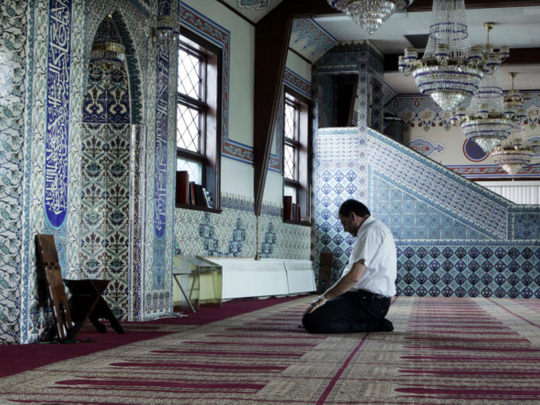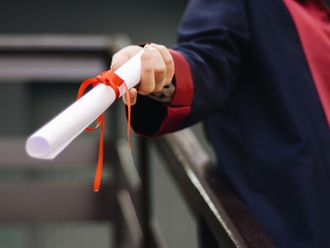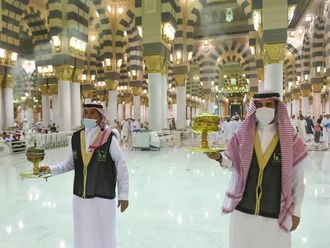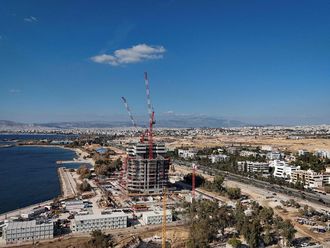
New York: Jaber scrutinised the crowd in front of him as he made his way out of the lift, looking for his friend Anas. The language student from the coastal Saudi resort of Jeddah had planned to walk with his friend to the Washington Monument and rest in a park until around 7 pm before heading back to their hotel, three blocks away from the White House.
On the way back, they would stop to end their fast. On is the first day of Ramadan, the two Saudi friends, although thousands of kilometres from home, wanted to remain committed to the full practice of the annual tenet of their religion.
Although the physically challenged and those travelling are normally exempted from fasting, especially if it poses risks to their health, Jaber, settled in Washington for summer college courses to improve his linguistic aptitudes, was keen on fasting.
“I am sure I can do it, so I should at least try. In fact, I do like the challenge and wish to show my gratitude,” he said as he waved to Anas, waiting for him by the computer table near the reception. “I know that many people resort to excuses in order to procrastinate their fast or to forget about it, but I find that not fasting by those who can do it totally unfair,” he said.
Most of the Arab tourists have already packed their suitcases to go home after spending days or weeks in the US capital, he said.
“There is no way that the really special Ramadan atmosphere back home can be replicated, even if there are many members of the family. The best thing is to go home and get immersed in the Ramadan way of life,” he said.
However, Ahmad, a cook at a hotel in Boston on the eastern coast of the US, could not go home to celebrate the special month with his family in Morocco.
He had expressed a wish to go home, but his bosses told him that while they appreciated his aspiration, they could not allow him to take off any day.
“July is the busiest month in Boston with lots of conferences and tourism tours and we simply cannot afford not to have you around,” they told him. He accepted their arguments stoically.
They were right, after all. The restaurant at the five-star hotel was full and omelettes prepared by Ahmad seemed to be particularly liked by the guests.
“It is nice to feel appreciated, but it has put me under tremendous pressure,” he said before flashing into a smile as he handed over the omelette he has just meticulously prepared for the young-looking Italian tourist.
The young Moroccan did not mind the relentless work. He has after all immigrated to the US to work and secure enough money to own a house and to send his two boys to college and have the education he could not have. However, it was the first day of Ramadan, and he was fasting.
“I have been here for four years and I have had to spend my Ramadan here,” he said. “I thank God for what He has given me and I am grateful. I just want to be spiritually more involved through longer prayers on time and more reading of the Quran during this special month. I understand that giving up some traditions and customs with family and friends is the trade-off for coming here to the US. I just wish I had more spiritual occasions during this Holy Month.”
Fasting reinforces in Muslims the values of patience, sacrifice and self-control and Ramadan serves to lift their spiritual standards and commitment to God through prayers, good deeds, acts of charity and reading of the Quran.
Ahmad said that he was not bothered by the smell and sight of the rich food around him at the restaurant. “I have learnt to focus on the greater challenge of fasting while people around me have their food. I am fine with that as well as waiting until late in the day before ending the fast.”
Those who claim that the sizzling heat this year might make it more challenging for US Muslims to fast should think twice, he said.
“People who come from the Middle East are well acquainted with the heat and humidity, so there is no excuse. Let us not forget that most people work in places where the air conditioner is turned on most of the day,” he said.
On July 20, the first day of Ramadan in the US this year, Muslims in Boston have to wait until 8:16 pm to end their fast. In New York City, the fast must not end until 8:30 pm.
Not far from the hotel where Ahmad worked, Khalid, originally from Iraq, said he was happy with the start of the month.
“It really reinforces my sense of identity as an American Muslim,” he said. “Of course I am proud to be from Iraq, but I have made my choice since 1991 and moved out. I came here and I have a good business,” he said. “I am grateful to all the people who helped me through various ways, but I am mainly grateful to God for His mercy and compassion. I would like of course to express my profound gratitude, mainly during this month,” he said. “I am also keen on sending a positive message to my US friends here about the true significance of Ramadan in particular and Islam in general,” he said.
An American Muslim group launched a campaign ahead of Ramadan to help Muslims in the US host non-Muslims for iftar so as to share the spiritual message of Ramadan and their understanding of Islam.
Nihad Awad, national executive director of the Council on American-Islamic Relations (Cair), said in a press release that “in order to enhance inter-faith relations, it is imperative that American Muslims reach out to their neighbours of all beliefs to offer balanced and accurate information about Islam and the Muslim community.”
According to media reports, one in four Americans has a negative perception about Islam.
Around 8 million Muslims are believed to live in the US, but surveys have often concluded that most Americans knew “very little about Muslims and Islam”.












